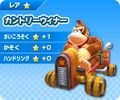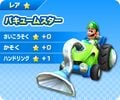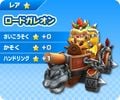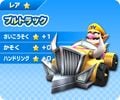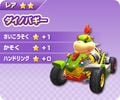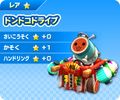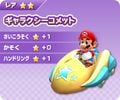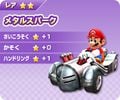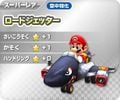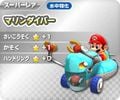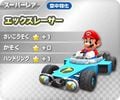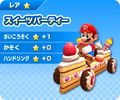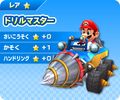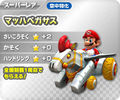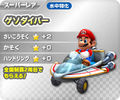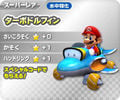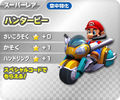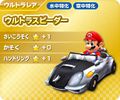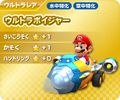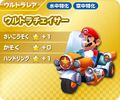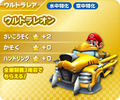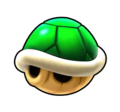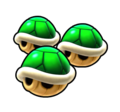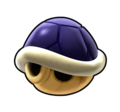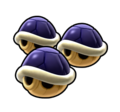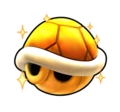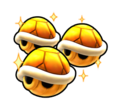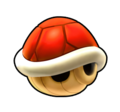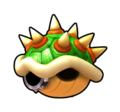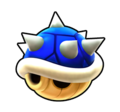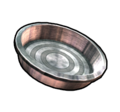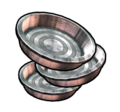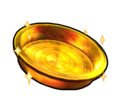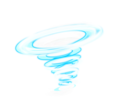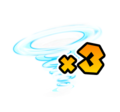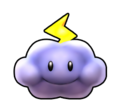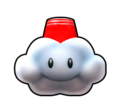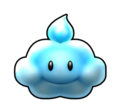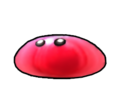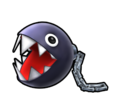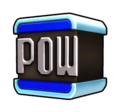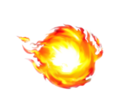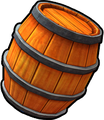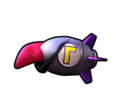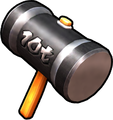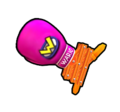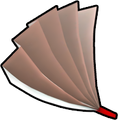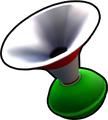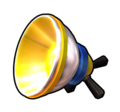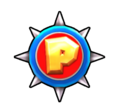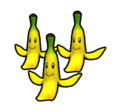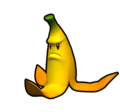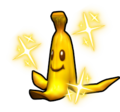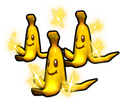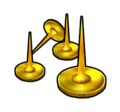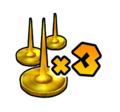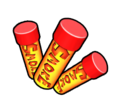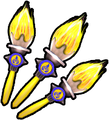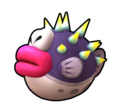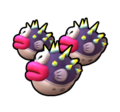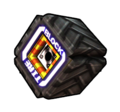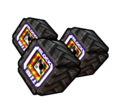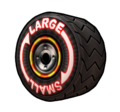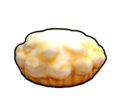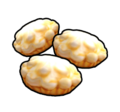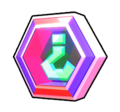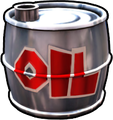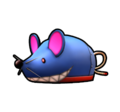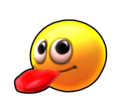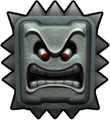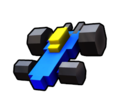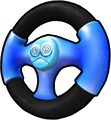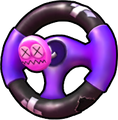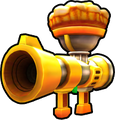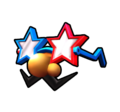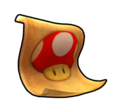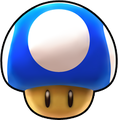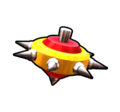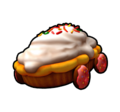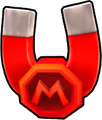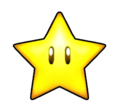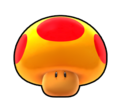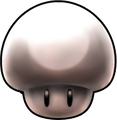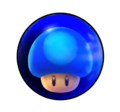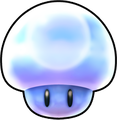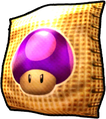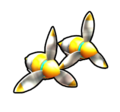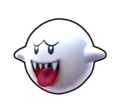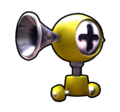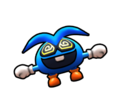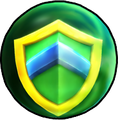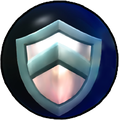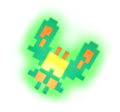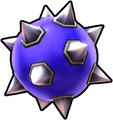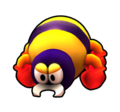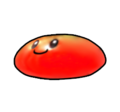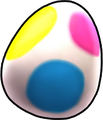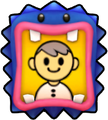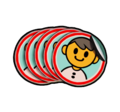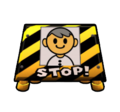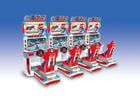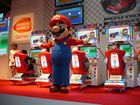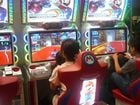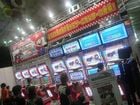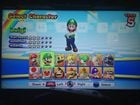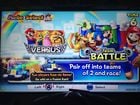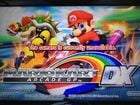Mario Kart Arcade GP DX
Template:Infobox Arcade Game Mario Kart Arcade GP DX is a Mario Kart game for arcade systems, developed by Namco Bandai Games in partnership with Nintendo. It is the tenth installment in the Mario Kart franchise and the third title in the Arcade series following Mario Kart Arcade GP 2, which was a follow-up to Mario Kart Arcade GP. The game was released in Japan on July 25, 2013 and in the United States during 2014. Just like the previous two Arcade GP games, it is possible to do multiplayer play by linking up to four cabinets.
Gameplay
Grand Prix, National Battle, and multi-player modes are featured in the game. Unlike the other two Arcade GP releases, Time Trial is not present in the game. First the player chooses a character. Then the player can choose between seven karts, five of them being unlockable. Before starting a race, the player can take their photography and decorate it with twelve included features, such as a samurai helmet and a pirate suit. On some cases, the camera cannot be used, in which the player's photography is their selected character's portrait. The arcade operator can set whether the camera should be used or not. The player can choose to play in 50cc, 100cc and 150cc, with the latter two being unlockable. The player then must choose which one of three themed tracks (Toad, Mario, Don-chan) they want to play. Like Mario Kart Arcade GP and Mario Kart Arcade GP 2, there are only six racers in each race rather than eight or twelve, with the exception of playing Versus with 2-4 players or Team Battle with 4 players; where there are four racers. Unlike the other two Arcade GP games, the goal of Grand Prix is to finish each race in 3rd or better. Every circuit has a time limit of 250 seconds, and when the player is at first place their photography has a crown. When the player completes a lap, lights between the game screen change color. The main feature of the game is that players can now play in cooperative (with 2 players) or in teams (with 4 players), similar to Mario Kart: Double Dash!! in that a player is the driver and the second shoots items. Cooperative or team play allows the player to gain a special power-up which transforms the player's kart into a Fusion Kart that will drive and the second player is called to control the turret and shoot unlimited amounts of Green Shells at any direction for a limited period of time.[1] Fusion Karts also have health bars when playing in Team Mode with 4 players. Additionally, gameplay elements from Mario Kart 7 such as the use of gliders and underwater courses are present.
Instead of Mario Cards like the last two installments, the player can use a Banapassport Card to save their progress. The game makes extensive use of downloadable content, where over the course of five years the game will gradually have more content added through major yearly updates, so in the end there will be a total of 30 courses, 20 characters, 120 vehicles and about 150 items, increased from 10, 12, 22 and 90 respectively as long as the machine is set up to an internet connection by the operator.[2]
The commentary from Mario Kart Arcade GP 2 returns and this time, it is voiced by Rica Matsumoto in the Japanese version and Jack Merluzzi in the American version.[3] Some of the quotes in this game are reused from the second game.
On July 1, 2015, update 1.04 for international version cabinets were released. Most (but not all) international version cabinets have this update installed, which includes two new characters, new features and a mode that allows a 2 on 2 team battle. The update also changed the time limit on races in the international versions from 180 seconds to 250 seconds (which is the same for the Japanese version) and added an Advice section after a single-player race (except for when a race is timed out). Also, the update changed the point distribution for Two Player Co-op and Team Battle races.
Modes
The game features five modes of play, with two single-player and three multiplayer:
Grand Prix
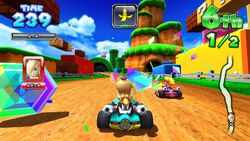
- Number of Players: 1
Grand Prix is the main mode of this game, and is a single-player mode. The player always starts in 6th place in each Grand Prix race, and the objective of Grand Prix is to finish each course in 3rd place or better within 250 seconds to go to the next course. Certain rounds have preset items while other rounds let the player choose their items. The player completes a cup by finishing each round of a cup in 3rd or better.
At first, the player can only pick 50cc, but as the player clears rounds, the 100cc and 150cc can be unlocked for play in Grand Prix mode. Also in 150cc, the number of laps to run for certain tracks (such as Splash Circuit) may increase.
When played on certain cabinets, only 100cc or 150cc Mirror is available, only one round can be played, and the Kart and Items the player gets is decided randomly.
Unlike the other two Arcade GP games, this game does not have a Challenge Minigame. Whenever a player completes a cup, they will be given the Congratulations screen.
National Battle
- Number of Players: 1
National Battle is an exclusive mode for Japanese cabinets. A new single-player mode in Mario Kart Arcade GP DX, this mode pits the player against other people in race tracks around the region. In this mode, players race to earn experience points to complete sections of the region, rank up and gain additional frames for their avatar. Here, the player selects a track to race from the limited tracks available. For each race except one-on-one battles, there are four karts competing and regardless of what cabinet number they use and who they face off against, they must always start each race in 4th place.
The goal of this mode is to complete sections of the region to earn points. A section of the region is complete once the player accumulates 100 points. The point system is as follows:
| Position | Points |
|---|---|
| 1st | 100 points |
| 2nd | 50 points |
| 3rd | 40 points |
| 4th | 30 points |
By completing all the sections of the region, the player is given the Congratulations screen. They will then receive special Karts for their performance.
When this mode is played during certain times, the player may be challenged on a one-on-one battle against a tougher opponent. The player cannot select the track though, and must compete in the track selected by the opposing player. The player's objective is to win the race, if done so, the player receives a present, in which the player picks one box out of the three to earn a reward.
Versus
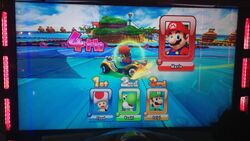
- Number of Players: 2-4
Versus, also known as Two Player Versus with two players, is a multiplayer mode in this game. By linking up to four cabinets, up to four people can take on Versus. This mode returns from the previous two Arcade GP games, and is the only mode available with three players. In this mode the players (and CPU if necessary) compete to see who can come in 1st place in a specified race track. In this mode, the players vote for a track. If tracks have the most equal amount of votes the easiest track will be selected. Then the player votes if they want to race in Normal or Mirror. If the vote is tied then the players always race in the Normal version of the track. In this mode, each player will select their three items and take their own photography, which will be displayed to the other players in the race. If a player cannot take a picture because the camera on their cabinet is disabled, the character they select will be revealed to the other players. In VS Race, Two Player Co-op and Team Battle, each player is given a color depending on which cabinet number they're on for easy identification:
| Player | Color |
|---|---|
| Player 1 | Red |
| Player 2 | Orange |
| Player 3 | Green |
| Player 4 | Blue |
| CPU | Yellow |
If less than four players gather for a race then CPU drivers are added depending on how many people join:
| No. of Players | No. of CPU | Total Karts |
|---|---|---|
| 2 Players | 2 CPU | 4 Karts |
| 3 Players | 1 CPU | 4 Karts |
| 4 Players | 0 CPU | 4 Karts |
CPUs, if any, will always start on the front spots. Then the players are arranged on the grid based on their player number, with the lower player numbers starting at a better grid spot.
Once the 1st place player finishes, the other players have 15 seconds to finish, if they don't they get the Time's Up screen. Either way, when they finish or time out, each player is given a screen which shows each player's finishing position in the race.
Only the 100cc class is available in Versus, though courses can be raced in Normal or Mirror. This also applies to the other multiplayer modes.
Two Player Co-op
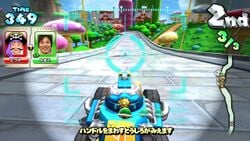
- Number of Players: 2
Two Player Co-op is a new mode to Mario Kart Arcade GP DX. As long as there are at least two cabinets are linked together, this mode can be played. Here, two players team up to race against two CPU teams of two players each. In this case there are three teams and six karts in total (of which four of them are CPU) and each team is vying for first place. Like other multiplayer modes, the players vote for a track, select their three items and take a photography. In the starting grid, the second team takes the 1st and 3rd spots, the third team takes the 2nd and 4th spots, and the human team that is team 1, starts 5th and 6th, with the 5th place starter being the lower player number. This race type has a special item that cannot be used by CPU players which is the Fusion Kart. Also, a feature exclusive to this mode in the game is the Friendship Shield, which also cannot be used by the CPU. This shield is deployed when the team's player karts are close to each other. After a race, each team scores points depending on each player's finishing position and the winner is the team who has the most points. The player can earn experience points to upgrade their Fusion Kart to a maximum level of six.
For a list of levels and items that the Fusion Kart can fire for each level, see here.
Team Battle
- Number of Players: 4
Team Battle is a brand new mode to Mario Kart Arcade GP DX. This mode cannot be played in arcades that link less than four cabinets. Added in an update, this mode sees four players split into two groups of two and compete to see who is the best. Like other multiplayer modes, the players vote for a track, select their three items and take a photography.
In this mode, the starting grid is as follows:
| Position | Player |
|---|---|
| 1st | Lower player number of Team 1 |
| 2nd | Higher player number of Team 1 |
| 3rd | Lower player number of Team 2 |
| 4th | Higher player number of Team 2 |
Like Two Player Co-op, this race type has a special item that can be used, which is the Fusion Kart. Unlike the Two Player Co-op race mode, Fusion Karts in this mode have health bars, in which if its health depletes, the tank will be destroyed and the players will take damage. It usually takes four hits to destroy the Fusion Kart. Unlike Two Player Co-op, this mode does not have the Friendship Shield feature. Just like Two Player Co-op after a race, each team scores points depending on each player's finishing position and the winner is the team who has the most points. If the players in one team finish 1st and 4th and the players in the other team finish 2nd and 3rd, the battle is considered a tie. The player can also earn experience points, just like Two Player Co-op.
Team Battle Point System
When players play in Two Player Co-op or Team Battle, a point system is used to determine which team wins. The point distribution is as follows:
| Position | Old Points | New Points |
|---|---|---|
| 1st | 12 points | 10 points |
| 2nd | 8 points | 8 points |
| 3rd | 6 points | 6 points |
| 4th | 4 points | 4 points |
| 5th | 2 points | 2 points |
| 6th | 1 point | 1 point |
- Old Points refer to older versions of the game (for example, when Team Battle for 4 players didn't exist).
- New Points refer to newer versions of the game (for example, when Metal Mario existed).
Mario Coin
Mario Coin makes a return from the previous game. By collecting Mario Coins, the player can unlock new content. Also, at the completion of a race, the player earns additional Mario Coins depending on their position and the mode played. The player unlocks new content, such as Karts after earning 50 Mario Coins.
Mario Coins can also be achieved through rewards earned from winning one-on-one battles in the National Battle mode.
Techniques
Rocket Start
The Rocket Start is a technique across all Mario Kart games. The player can perform this technique by holding the gas when "1" is displayed during the start of the race. This technique seems similar to the recent four Mario Kart console versions, except that the player must perform the technique at "1", not "2".
Jumping and drifting
The player can jump by pressing the Brake while holding the gas pedal. To drift, the player does the same thing as jumping, but by turning the wheel to the desired direction.
While drifting can help shield the player against rival attacks, drifting is also the method to Drift Boosting. A new feature in the Arcade GP series, the player can charge up to a maximum of three levels and receive a Drift Boost, once the player straightens the steering wheel. The higher the level when the player straightens the steering wheel, the more effective the Drift Boost.
Playable characters
The latest version of the game features a total of 16 playable characters (9 are default, 3 are unlockable, and 4 are downloadable).[4] Characters are divided into four weight classes (feather, light, medium, and heavy).[5] Also, some characters have palette swaps that can be selected on the character select screen.[6]
Middleweight
- Firemario.jpg
Fire Mario (Palette Swap of Mario)
- Iceluigi.jpg
Ice Luigi (Palette Swap of Luigi)
Lightweight
- Redyoshi MKAGPDX.jpg
Red Yoshi (Palette Swap of Yoshi)
- Blackyoshi MKAGPDX.jpg
Black Yoshi (Palette Swap of Yoshi)
Waluigi (unlockable)
- Babymario MKAGPDX.jpg
Baby Mario (downloadable)
- Babypeach MKAGPDX.jpg
Baby Peach (downloadable)
Featherweight
- Blue Toad MKAGPDX.jpg
Blue Toad (Palette Swap of Toad)
Don-chan (New Driver from the Taiko no Tatsujin series)
Bowser Jr. (unlockable)
- Hero Don-Chan (Palette Swap of Don-chan)
Heavyweight
- MKAGPDX DK artwork.jpg
Dry Bowser (Palette Swap of Bowser)
Wario (unlockable)
- Rosalina Artwork MKAGPDX.jpg
Rosalina (downloadable)
- MKAGPDX Metal Mario.jpg
Metal Mario (downloadable)
Gold Mario (Palette Swap of Metal Mario)
Non-playable characters
- King Bob-omb[7]
- Fire Piranha Plants[8]
- Toads[9]
- Koopa Troopa[10]
- Cheep Cheeps
- Lakitu
- Chain Chomp (cameo)[11]
- Goomba
- Bullet Bills
- Dolphins[12]
- Piantas
- Blooper (cameo)
- Sushi (cameo)
- Fishin' Lakitu[13]
- Lantern Eel (Taiko no Tatsujin series character)
- Shy Guys
- Dry Bones[14]
- Magikoopas
Karts
There are twenty-eight karts to choose from, and gliders are automatically preset when selecting a kart. Other karts are downloadable and to be released, with some being recolours of existing karts.
Items
Mario Kart Arcade GP DX has the most items out of any Mario Kart game; a grand total of 100 items. The player can only use three items per race. In the Japanese cabinets, on most cases, the player picks three items to use for the race while in most other cabinets, the player receives a forward item, a backward item and a special item. Additionally, certain downloadable palette swaps of characters will enable the use of an exclusive powerup only available to that swap.
Attack Items
Giant Gummy<ref name="dillon ela Toad Cup 2016">
Interference Items
Special Items
- MKAGPDX Power Ball.png
- MKAGPDX Stun Stick.png
Courses
The game currently features 10 race tracks, all of which share the general track layouts of courses in Mario Kart Arcade GP 2 but modified significantly, mainly to alter their theme and accommodate the vehicles. Only the Mario and Bowser Cups keep their tracks' original branding, while the Yoshi Cup becomes the Toad Cup, the Donkey Kong Cup becomes the Don-Chan Cup, and the Waluigi Cup becomes the Bowser Jr. Cup. The Wario, Pac-Man, and Rainbow Cups are removed entirely, and it is unknown if these courses will return through future updates to the game.
| Toad Cup | Mario Cup | Don-chan Cup | Bowser Jr. Cup | Bowser Cup |
|---|---|---|---|---|
 Peach Castle |
 Splash Circuit |
 Bon Dance Street |
 Aerial Road |
 Bowser Factory |
 Kingdom Way |
 Tropical Coast |
 Omatsuri Circuit |
 Sky Arena |
 Bowser Castle |
References to other games
- Super Mario Bros.: The Toad Cup's tracks contain scenery based on objects and landmarks from this game.
- Mario Kart: Double Dash!!: As with the previous Arcade GP games, sound effects from this title are re-used, such as the race start countdown and the item roulette.
- Mario Party 6: Toad and Waluigi's artworks are reused in this game.
- Mario Party 7: Wario's artwork is reused in this game.
- Super Mario Galaxy: Bowser Jr.'s artwork is reused in this game.
- Mario Party DS: Mario and Luigi's artworks are both reused in this game.
- Mario Super Sluggers: Baby Mario and Baby Peach's artworks are reused in this game.
- Mario and Sonic at the Olympic Winter Games: Donkey Kong and Dry Bowser's artworks are reused in this game.
- New Super Mario Bros. Wii: Peach and Bowser's artworks are both reused in this game. Also Toad's artwork appears in the Game Over screen.
- Fortune Street: Princess Peach's artwork is reused in the Game Over screen.
- Mario Kart 7: Gliding and underwater driving from this game are present. Also, Metal Mario's artwork is reused from this game.
- Mario Party 9: Yoshi's artwork is reused in this game.
- New Super Mario Bros. 2: Gold Mario is playable as a palette swap of Metal Mario.
- Mario Golf: World Tour: Gold Mario's artwork (sans golf club) is reused in this game.
Staff
- Main article: List of Mario Kart Arcade GP DX staff
Gallery
Mario collecting Mario Coins on Splash Circut.
- MKAGP Time Out.JPG
The screen in the American version of the game that is shown if a player runs out of time.
Trivia
- Alongside photographed images of players, it's been shown that several avatars can be used as an alternative in some cabinet types. These avatars are reused from some of Namco Bandai Games's earlier titles, being We Ski, We Ski & Snowboard, and Go Vacation.
- Don-chan and Yoshi are currently the only characters to have three palette swaps.
- This is the first Mario Kart game with palette swaps, with the second being Mario Kart 8.
- Although this is the only Mario Kart game to not be released in Europe, some arcades in Europe have this game. However, the cabinets in Europe use the old version, which exclude some characters and features most US and Japanese cabinets have.
References
- ^ Kotaku - In This New Mario Kart, You Can Drive a Tank
- ^ http://arcadeheroes.com/2014/03/25/new-details-mario-kart-arcade-gp-dxs-online-features/
- ^ https://youtu.be/D6-oyizvhho?t=59
- ^ http://mariopartylegacy.com/2013/07/mario-kart-arcade-gp-dx-slowly-arrives-in-japan/
- ^ http://blog.goo.ne.jp/drumcan/e/3203c4f8cec19ee191fe7194c6eb30e9
- ^ http://www.amazon.co.jp/別冊てれびげーむマガジン-スペシャル-マリオカートアーケードグランプリDXスペシャル号-エンターブレインムック/dp/4047301264/ref=sr_1_1?s=books&ie=UTF8&qid=1417662589&sr=1-1&keywords=別冊てれびげーむマガジン+スペシャル
- ^ [1]
- ^ [2]
- ^ http://www.youtube.com/watch?v=VKAJcwYVEvY
- ^ http://www.youtube.com/watch?v=VKAJcwYVEvY
- ^ http://www.youtube.com/watch?v=DPOjmAWwcJQ
- ^ http://www.youtube.com/watch?v=npYMKytD_Ns
- ^ http://www.youtube.com/watch?v=ZxWMC0J4YTo
- ^ https://www.youtube.com/watch?v=vGEuklaCzwE
- ^ https://www.youtube.com/watch?v=aoJlEMbNkjo
- ^ https://www.youtube.com/watch?v=bqn_ZEYltPY
External link
Template:BoxTop Template:MK Players Template:Mariogames
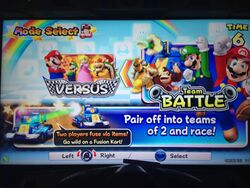








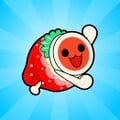




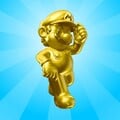
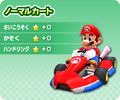
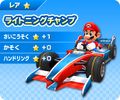
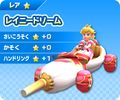
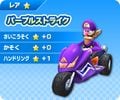
![Mash Run[15]](https://mario.wiki.gallery/images/thumb/c/c1/MKAGPDX_Toad_Kart.jpg/120px-MKAGPDX_Toad_Kart.jpg)
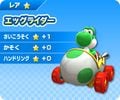
![Sol Balloon[16]](https://mario.wiki.gallery/images/thumb/f/f1/MKAGPDX_Pac-Man_Kart.jpg/120px-MKAGPDX_Pac-Man_Kart.jpg)
